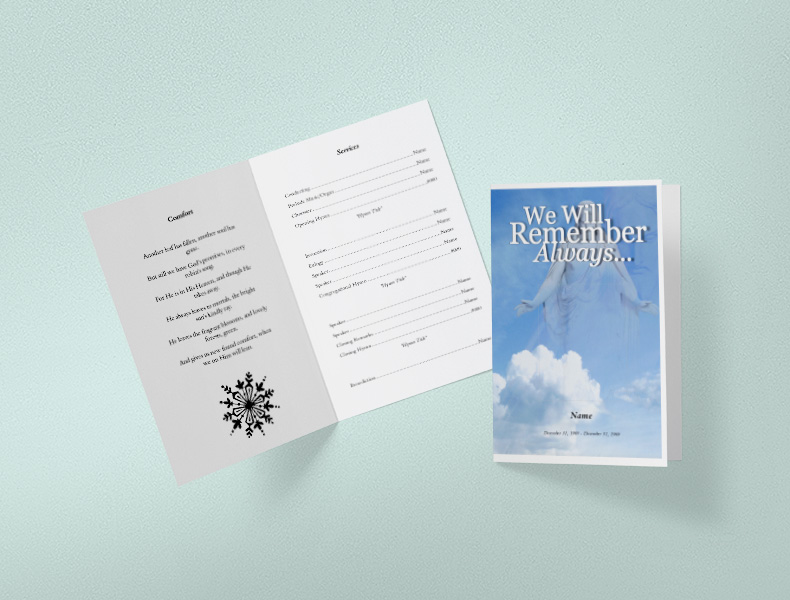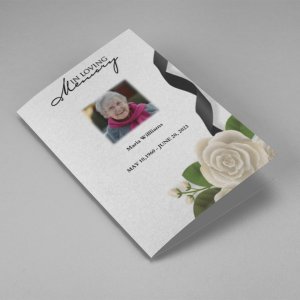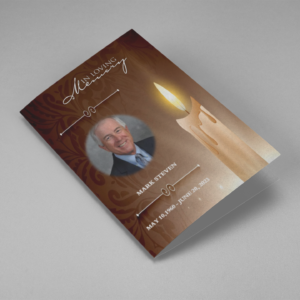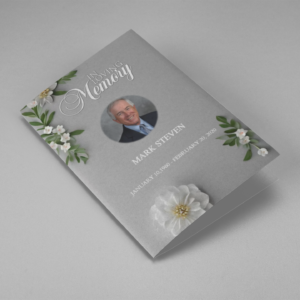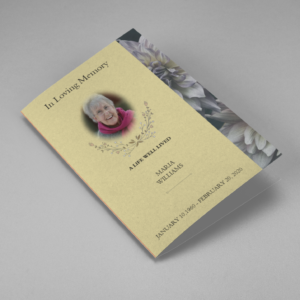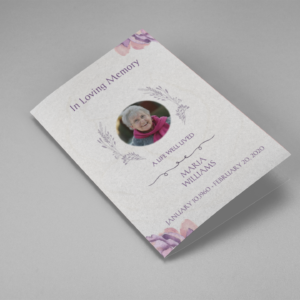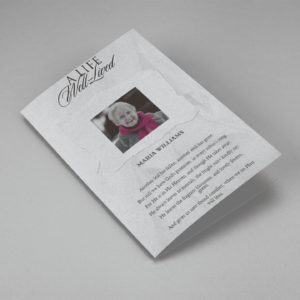What to Say at a Funeral
Although death is one of the things that are certain in life, most if not all people still find it difficult to deal with it when placed in this situation. Grieving for the death of a loved one is a long process that takes time and acceptance. However, with the help and concern of other people, this process is made a little easier for the people who are in grief.

-
Searching for a White Roses And Black Ribbon Funeral Program Template that is easy to print and has a cutting-edge look? White Roses And Black Ribbon Funeral Program Template is the Perfect decision because it measures 8.5”x 11”.
- No Limitation on Content, Edit anything
- Edit anytime – unlimited revisions even after purchased
- Get a printable PDF downloaded to get it printed on your own
-
Searching for a Realistic Burning Candle Funeral Program Template that is easy to print and has a cutting-edge look? Realistic Burning Candle Funeral Program Template is the Perfect decision because it measures 8.5”x 11”.
- No Limitation on Content, Edit anything
- Edit anytime – unlimited revisions even after purchased
- Get a printable PDF downloaded to get it printed on your own
-
Searching for a Bulltongue Arrowhead Funeral Program Template that is easy to print and has a cutting-edge look? Bulltongue Arrowhead Funeral Program Template is the Perfect decision because it measures 8.5”x 11”.
- No Limitation on Content, Edit anything
- Edit anytime – unlimited revisions even after purchased
- Get a printable PDF downloaded to get it printed on your own
-
Searching for a Grey Floral White Tiny Flower Funeral Program Template that is easy to print and has a cutting-edge look? Grey Floral White Tiny Flower Funeral Program Template is the Perfect decision because it measures 8.5”x 11”.
- No Limitation on Content, Edit anything
- Edit anytime – unlimited revisions even after purchased
- Get a printable PDF downloaded to get it printed on your own
-
Searching for a Red Flower Dark Soil Funeral Program Template that is easy to print and has a cutting-edge look? Red Flower Dark Soil Funeral Program Template is the Perfect decision because it measures 8.5”x 11”.
- No Limitation on Content, Edit anything
- Edit anytime – unlimited revisions even after purchased
- Get a printable PDF downloaded to get it printed on your own
-
Searching for a Pink Rose Frame Floral Oval Badge Funeral Program Template that is easy to print and has a cutting-edge look? Pink Rose Frame Floral Oval Badge Funeral Program Template is the Perfect decision because it measures 8.5”x 11”.
- No Limitation on Content, Edit anything
- Edit anytime – unlimited revisions even after purchased
- Get a printable PDF downloaded to get it printed on your own
-
Searching for a Brown and White Classic Funeral Program Template that is easy to print and has a cutting-edge look? Brown and White Classic Funeral Program Template is the Perfect decision because it measures 8.5”x 11”.
- No Limitation on Content, Edit anything
- Edit anytime – unlimited revisions even after purchased
- Get a printable PDF downloaded to get it printed on your own
-
Searching for a Purple Elegant Watercolor Funeral Program Template that is easy to print and has a cutting-edge look? Purple Elegant Watercolor Funeral Program Template is the Perfect decision because it measures 8.5”x 11”.
- No Limitation on Content, Edit anything
- Edit anytime – unlimited revisions even after purchased
- Get a printable PDF downloaded to get it printed on your own
-
Searching for a Cream and Green Photo Obituary Program that is easy to print and has a cutting-edge look? Cream and Green Photo Obituary Program is the Perfect decision because it measures 8.5”x 11”.
- No Limitation on Content, Edit anything
- Edit anytime – unlimited revisions even after purchased
- Get a printable PDF downloaded to get it printed on your own
-
Searching for a Cream Simple Elegant Photo Church Program that is easy to print and has a cutting-edge look? Cream Simple Elegant Photo Church Program is the Perfect decision because it measures 8.5”x 11”.
- No Limitation on Content, Edit anything
- Edit anytime – unlimited revisions even after purchased
- Get a printable PDF downloaded to get it printed on your own
-
Searching for a Grey Classic Minimalist Funeral Program Template that is easy to print and has a cutting-edge look? Grey Classic Minimalist Funeral Program Template is the Perfect decision because it measures 8.5”x 11”.
- No Limitation on Content, Edit anything
- Edit anytime – unlimited revisions even after purchased
- Get a printable PDF downloaded to get it printed on your own
-
Searching for a White Classic Funeral Program Template that is easy to print and has a cutting-edge look? White Classic Funeral Program Template is the Perfect decision because it measures 8.5”x 11”.
- No Limitation on Content, Edit anything
- Edit anytime – unlimited revisions even after purchased
- Get a printable PDF downloaded to get it printed on your own
During funerals, many people are careful about the words they say or actions they do in front of the grieving family members. Generally, the attendees do not want to give additional grief to those affected, hence the tendency is to keep quiet and simply extend their support silently. People who attend funerals must be aware of the proper etiquettes to be observed during this time and observe the do’s and don’ts.
The most common and sincere way of extending your sympathy is to say “I am sorry” to the bereaved for his loss. These three words are enough to convey to the grieving person that you understand the importance of the deceased person in his life and that you share his sadness. These words are enough to show that you sincerely care for the bereaved.
More than talking, listening is very important during funerals. Studies show that people who have suffered losses accept their situation quickly with the help of other people who are willing to listen and help them deal with their grief. During this period, the bereaved needs to express his sadness and anger together with the memories of the deceased person.
The need to talk is an outlet of letting out all of their feelings about the situation. A person does a lot of help simply by listening. It is best not to push the bereaved to talk about his lost loved one rather this should be a spontaneous thing. You should refer to the deceased person by name, using no other terms. Memories are bound to come up during your conversation with the aggrieved, and no matter how repetitive it might become, just try to be patient in listening.
Nonverbal actions are equally important during funerals. A gentle, sincere hug or a shoulder to cry on is what a bereaved person needs to feel to know that he is not alone in his grief. Death brings out the vulnerability of every person hence the simplest touch could be a source of strength for the grieving people.
Grieving is normal as it forms part of our complex emotions as human beings. Grief is not something we can simply set aside. During funerals, it is suggested that you ask the bereaved if you can do anything to help them. Even if they do not have anything in mind, it helps a lot on the part of a grieving person to know that he is surrounded by friends that care for his welfare. Support in whatever form will be greatly appreciated by the bereaved and will weigh favorably on their acceptance of their situation. Death is hard to accept but can be made easier by the love extended by people who truly care.
